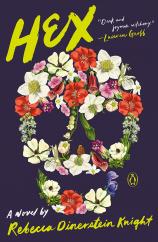Hex
Review
Hex
While it would be accurate to describe Rebecca Dinerstein Knight’s second novel, HEX, as a story of deadly plants and romantic obsession, that ominous, provocative capsule summary, unfortunately, would leave a misleading impression. Though Knight again displays some of the talent that made her debut novel, the exotic and wistful THE SUNLIT NIGHT, so appealing, this effort doesn’t deliver on its promise to either unsettle or entertain.
HEX revolves around a sextet of characters at present-day Columbia University. Its narrator, Nell Barber, is a PhD student in botany (her specialty is oak trees) who is expelled, along with several of her colleagues, from her program when a fellow student dies of thallium poisoning in a laboratory accident. “Frantic, and disgusted with myself and my humdrum studies and my whole pasty anemic priceless life,” Nell is consigned to what she calls “my private exile” in the “huge and unschooled solitude” of her Brooklyn apartment. There she spends her days engaged in homemade experiments to neutralize botanical toxins, including the deadly poison ricin, derived from the castor bean whose seeds she’s pilfered from her former lab.
"While HEX has its tantalizing moments, in the end there aren’t enough of them to bring the reader under its spell."
Nell pours out her anguish in three notebooks addressed over the space of six months to her former academic advisor, Joan Kallas. In them, she documents the story of her professional and personal attraction to her professor. In those same pages, she chronicles the complicated sexual choreography that emerges among Joan and the novel’s remaining characters --- Nell’s best friend, Mishti Singh, a chemistry graduate student; her former boyfriend, Tom Ottoway III, who is pursuing a master’s degree in Medieval and Renaissance Studies; Joan’s husband, Barry Estlin, a university administrator; and Carlo Parada, a graduate student in business “preparing for a career in General Affluence.” Nell describes their “evolutionary food chain parade across my eyelids” in her often droll style:
“Mishti, wunderkind, 26; Nell, Homo sapiens, 31; Carlo, half-machine, 35; Joan, sorceress, 41; Barry, troll, 45. Tom wasn’t in the food chain because centaurs don’t eat or get eaten.”
Suddenly and involuntarily separated from regular contact with Joan after her summary dismissal by a committee that included Barry as one of its members, Nell has plenty of time to ruminate on their fractured relationship. “I don’t know. I like to know her, I like to please her, I would report the weather to Joan if I could,” she tells Tom, obliquely hinting at the depth of a desire for approbation she describes in these words:
“I met you and I didn’t want you. Why want you? I’d never seen a grown woman wanted…. I wanted an A, an adviser, a witness to my tiny genius. I wanted a mother more esoteric and contemporary than my own. I wanted a relation more rigorous than friendship. I wanted partnership. I wanted science.”
That attachment, one that briefly slides toward overtly sexual territory, becomes even more complicated when Nell discovers that Joan is “legitimately interested in Tom, that it was happening.” Of that development, she reminds Joan, “Only real tenderness inspires your most random and needless cruelty.”
As these and other liaisons within her circle form, briefly flourish and crumble, Nell’s ruminations on life and love spill onto the page in edgy profusion. Veering between acute self-awareness and emotional obtuseness, the fact that their objects often aren’t sufficiently consequential to evoke sustained interest mostly renders them more clever than profound.
At one point, Nell and Mishti dabble in something that hints at witchcraft, though Nell admits this “was reckless of us, because we didn’t even know which spirits we wanted to call.” The third volume of the notebook is dedicated to the 12th-century German nun and mystic Hildegard von Bingen, who is noted, among her many accomplishments, for her research into herbal remedies. But like so much of the novel, these threads, though intriguing, never become part of the weave of an emotionally satisfying tapestry. While HEX has its tantalizing moments, in the end there aren’t enough of them to bring the reader under its spell.
Reviewed by Harvey Freedenberg on April 3, 2020
Hex
- Publication Date: March 30, 2021
- Genres: Fiction, Women's Fiction
- Paperback: 224 pages
- Publisher: Penguin Books
- ISBN-10: 1984877399
- ISBN-13: 9781984877390




